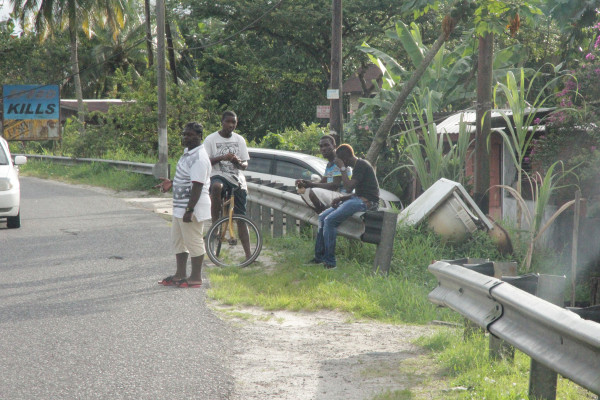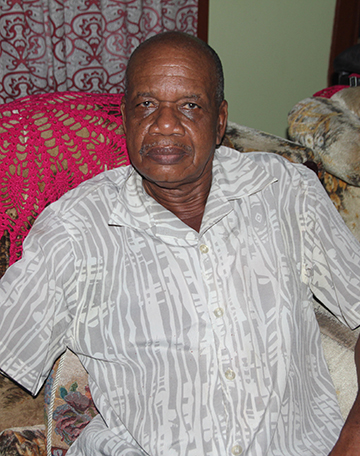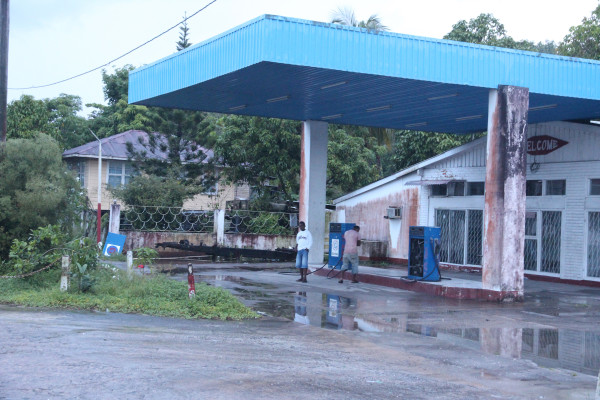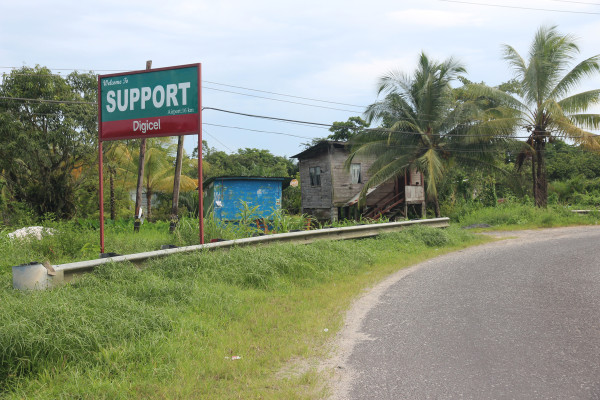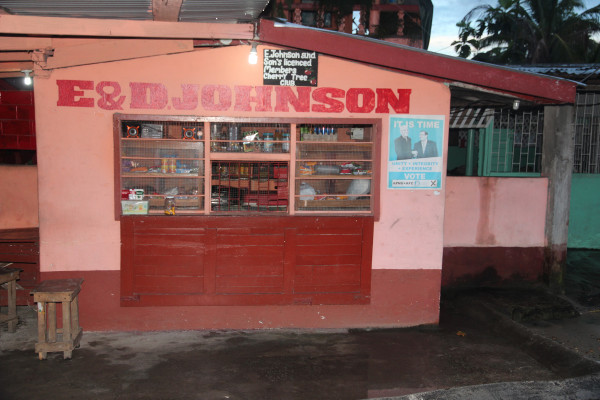Replies sorted oldest to newest
we should have stayed British
Saw the clips on Youtube,
the country was cleaner then,i guess the people cared,
during my teenage age spent in GT living on Durban and Smith St,
i an recall Georgetown was clean and were free to walk without getting robbed.
RiffRaff posted:we should have stayed British
Nah..didn't like the White Masters,they lived lavish lifestyles in their compound which was among the poor.
Django posted:RiffRaff posted:we should have stayed British
Nah..didn't like the White Masters,they lived lavish lifestyles in their compound which was among the poor.
And what is different from today? Django, you too young to remember the good old British days..days when you attend a parochial school and you say your prayers, sing "god save the queen" on Friday afternoons, all the workers were taken care of and the schools were top notch.
The Victorian architecture of colonial Georgetown is beautiful. Now the Marriott Building and the GBTI Structure in Kingston towers over all.
Django posted:RiffRaff posted:we should have stayed British
Nah..didn't like the White Masters,they lived lavish lifestyles in their compound which was among the poor.
It would not been that way now...we would have been more developed plus we would not have to deal with PNC and PPP
I remember when the sugar estate at Leonora had a staff club. My uncle will take me there to seea Saturday matinee while he has a few drinks with his buddies. In later years as i got older i went by myself and took a few friends with me. The drinks and snacks went on my uncle tab which he took care of at the end of the month. At years end he use to get a decent back pay. Life was great in my younger days under the British rule. We never lined up for anything like during the Burnham era and no blackouts that i can remember of
Amral posted:I remember when the sugar estate at Leonora had a staff club. My uncle will take me there to seea Saturday matinee while he has a few drinks with his buddies. In later years as i got older i went by myself and took a few friends with me. The drinks and snacks went on my uncle tab which he took care of at the end of the month. At years end he use to get a decent back pay. Life was great in my younger days under the British rule. We never lined up for anything like during the Burnham era and no blackouts that i can remember of
You have to live that time to appreciate the benefits of the white man running a good business. I remember my parents getting a bonus and holiday pay when the sugar industry exceeded target. These days you lucky if you have a job.
One of the best things Guyana received in the British colonial days is education. For example, people like Sridath Ramphal, Lionel Luckhoo, Fenton Ramsahoye, among the scholars of the day. Now the handful of the best and the brightest are leaving Guyana to live and work in other countries. There are a few bright people like Anil Nandlall still there.
And the best thing under Burnham i got was free text books for school and exercise books with his pic on the cover
Amral posted:And the best thing under Burnham i got was free text books for school and exercise books with his pic on the cover
Amral, the slate and pencil was a better deal. Not sure if you remembered those days. Don't forget those pens where you have to dip the nib into the ink all the time. We called them "hand pen".
Yeah i had my share of those in lil abc and big abc. Those pens messed up a few of my shirts. Parker fountain pens
If Guyana ever get back to a better country only then I will consider visiting. Right now no way i will ever go there
skeldon_man posted:Amral posted:And the best thing under Burnham i got was free text books for school and exercise books with his pic on the cover
Amral, the slate and pencil was a better deal. Not sure if you remembered those days. Don't forget those pens where you have to dip the nib into the ink all the time. We called them "hand pen".
One morning while everyone was out in the school yard exercising, the headmaster was upstairs on the corridor and signaled me to approach him. I was scared to death and thought he was going to cane me because I wasn't exercising properly. He handed me his ink bottle and asked me to wash it. ![]()
Amral posted:And the best thing under Burnham igot was free text books for school and exercise books with his pic on the cover
You lucky,I had to buy [used ones] in 1967 when in Form 3,studying for CP.
Django posted:Amral posted:And the best thing under Burnham igot was free text books for school and exercise books with his pic on the cover
You lucky,I had to buy [used ones] in 1967 when in Form 3,studying for CP.
I did not know they sold used text books. For a while I thought you bought used exercise books.![]()
skeldon_man posted:Django posted:Amral posted:And the best thing under Burnham igot was free text books for school and exercise books with his pic on the cover
You lucky,I had to buy [used ones] in 1967 when in Form 3,studying for CP.
I did not know they sold used text books. For a while I thought you bought used exercise books.
There was an Indian Pastor named Harrichand [Great Person,family well respected] had a little book store,two villages away from my home village.Due to we were poor my we got a discount,those days one dollar goes a mile.
I remember that shop. Anna Catherina
He had some nice coolie girls in his church. I need not say more
Amral posted:I remember that shop. Anna Catherina
Me thinks that place have new owners.
If anybaddy hambug Gilbakka, me badboy friend Bill go bus yuh head wid he slate and juk yuh batty wid de slate pencil.![]()

Bibi Haniffa posted:One of the best things Guyana received in the British colonial days is education. For example, people like Sridath Ramphal, Lionel Luckhoo, Fenton Ramsahoye, among the scholars of the day. Now the handful of the best and the brightest are leaving Guyana to live and work in other countries. There are a few bright people like Anil Nandlall still there.
For a country with a small population Guyana is gifted with brilliant people. Too bad they are scattered all over the world ![]() Politics f-ed up a good place.
Politics f-ed up a good place.
Gilbakka posted:If anybaddy hambug Gilbakka, me badboy friend Bill go bus yuh head wid he slate and juk yuh batty wid de slate pencil.
Thanks Gilly. Where is the bag twine holding the sides of the frame together? I thought that hole was to put a piece of bag twine to hang around your neck so you don't drop your slate crack it. Saved me a lot of cutrass, I did not drop too many.
shoots....never had that experience...i grew up with computers. You chaps must be real old timers.
VishMahabir posted:shoots....never had that experience...i grew up with computers. You chaps must be real old timers.
You lucky,the first one i got was in 1997.
my younger son grew up with computers,which i assembled for him.
I once did my work on a slate using a hair pin, evything I wrote stayed embedded in the slate and had to be tossed..but I got my work done...main thing.
They should not have changed the name of the country to Guyana. British Guiana and the Royal Family are great marketing tools. That is why those Jamaicans with all their big talk about black this and black that but they still have the Queen as head of state. They are not stupid.
But we stupid Guyanese had to even mess that up by trying to out do Africa. Now most people in the world think Guyana is in West Africa. So the country get the Africa tribal primitive treatment.
Prashad agrees with some of the people on this Board who support keeping BG and the Queen.
Gilbakka posted:If anybaddy hambug Gilbakka, me badboy friend Bill go bus yuh head wid he slate and juk yuh batty wid de slate pencil.
Gilbakka like he planning to make a primary school comeback. He could create real history by becoming Guyana oldest primary school student. Just like the first man from Guyana to race his horse in the Belmont stakes.
Nahhhh is people like, Druggie, Bibi' yugi, and dem who could use lil abc all ova agin.
Prashad posted:Gilbakka like he planning to make a primary school comeback. He could create real history by becoming Guyana oldest primary school student.
FYI, Prash, Gilbakka recently enrolled in Old Lil ABC/Old Prep A class. I'm looking feverishly for a textbook named CARIBBEAN READER Book 1. It begins with: "Mister Joe builds a house." And it has another sentence: "Mother Hen and her chicks." And another one about Master Willy the pig.
Someone can post the article. I am at work
Story and photos by Joanna Dhanraj
In 1954, two-year-old Nebert Perch left her home in Buxton and travelled with her mother Una Bobb Samuels and four-year-old brother Rudolph to a tiny village called Supply, today known as Support.
Her mother was a single parent trying for a better life for her children and she had migrated to Support with a few other women to cook for the men working on the bridges along the East Bank Demerara. Not very long after, she met a man who took her and the children in and Perch’s stay in Support eventually became a permanent one.
Perch recalled arriving in a village overrun by bushes. Today although houses line both sides of Support, some areas are still filled with bushes, with houses catering for a population of almost 200, peeking out here and there.
She recalled attending the Supply Primary School, then a one storey troolie building, which is now a wooden two-storey structure.
Perch said back in her days the welfare officer made checks during the week to see if children were home or in school and if you were home you had better be sick. She said that whenever they stayed home they ensured that they remained inside so as not to have any run-ins with the welfare officer whom they all feared.
Going to school in her time meant you had to keep a sharp memory since they were no books and pencils. She recalls using a slate and once the lesson was taught, the work was rubbed out, “so you had to see that you keep it up here,” said Perch, pointing to her head. There was no nursery school; kindergartens were for the well-off families who could afford to send their children to private schools.
Perch said they learnt their alphabet and numbers in “Lil ABC and Big ABC,” Prep A and Prep B or Grades One and Two. “At the end of Big ABC you had to know to read Caribbean Readers and Mr. Joe Builds A House. There were Mr. Tibbs [cat], Miss. Peg [pig], Miss. Cuddy [goat] and Percy the chick,” she said, recalling the names of the characters of the book. She and her little classmates would often assemble at the back of the school to learn their multiplication tables and to spell in syllables.
After school, Perch played along the road homeward bound but said it wasn’t considered dangerous since vehicles only passed by every two hours or so. This was because the main mode of transportation was by boat.
During those years, three chicken farms provided jobs for many of the villagers.
“Early in the mornings you’d hear the soldiers coming from a distance, doing their usual morning runs; and you know we didn’t have soldiers that were disrespected? They were some really strapping men, not like the ones we have today and we used to be scared of them. Today people are friends with the policemen but not in my days, you always stayed inside,” said a smiling Nebert.
According to her, the children of her day were more modest. “We called everybody uncle and auntie. They were mannerly young men and women. The big boys kept to themselves and the little boys were always one side, playing cricket or other games while the little girls stayed home. Today you see boys and men hanging together and little girls walking the road. The men smoking their cigarettes and the boys looking on; this is why we have young boys smoking cigarettes in our country,” she lamented.
Today, Perch enjoys planting her kitchen garden, rearing her chickens and taking care of her grandchildren. Decades later, with all the happy memories that came with Support, here will always be her home.
Around the bend from Perch, a few young men gathered together for an afternoon chat, raised a hand in greeting. A little further along is the home of 86-year-old Evangeline Johnson, believed to be the second oldest person in Support, who was enjoying the afternoon breeze and a chat with a few relatives and customers while watching television.
Johnson, who hails from Jacobus, situated way into the West Bank Demerara went to live in Support in 1961, at the age of 30, after marrying the now late, Percy Johnson. She recalled a place with a few houses but lots of bush and a red road, the East Bank Demerara Public Road, that ran through the village. According to her if you didn’t traverse by the bus or boat then you most likely took the donkey cart, which was a common mode of transportation then.
Eleven years after arriving in Support, Johnson lost her husband and was left to fend for herself and eight children, between the ages of one and 12 years old. Her eldest daughter from another union took care of the children while she worked in the cane fields, weeding. Sometimes she travelled to Timerhi where she worked on privately owned farms.
“Our young people today are more civilised. They know everything,” she said, considering the teachers, nurses and doctors Support would have produced.
She sees to it that the nearby trench is kept clean so she isn’t affected by floods.
Johnson concludes that all of the years she’s lived at Support, she’s never had a problem with any of the villagers and has come to love the peaceful nature of the village.
A few lots away lives Rodwell Gaskin, the village councillor, responsible for all of the villages from Craig to Caledonia. He lives with his wife, Violet Gaskin and son, Andrew Gaskin. Of the 32 years that Gaskin’s been living here, he’s spent 21 of them voluntarily working as a councillor. He said he loves helping the people in his community. In most cases, he helps villagers with environmental issues, mainly the drainage. “The koker is blocked under the bridge by a slab of concrete which doesn’t allow a proper flow of the water. I always make reports about the koker at the RDC [Regional Democratic Council] meeting, which is held once a month but nothing has been done as yet,” he said.
Apart from the drainage, Gaskin says there aren’t any other problems. “We’ve come a far way since many years ago. We have more houses that have gone up. This is mainly a family-oriented area. Everybody looks out for everybody here,” he said.
Gaskin, an influential person in the village, not only loves doing this but is proud of his work. He said he is privileged to help his villagers and those of the nearby communities. Apart from being a village councillor, he sells icicles and custard blocks.
Donald Daniels, Gaskin’s neighbour has been living in Support all his life. Although he didn’t have much to say, the enthusiastic villager sang high praises of his village. The carpenter reminisced about his childhood days when he would have gone to Supply Primary then Campbell’s Primary in Eccles. According to Daniels, he always looked forward to the August vacation since he did not do so well academically and those being the days of the “wild cane” and “bamboo,” he couldn’t wait to get out of school. However he’s managed to make a fine life for himself and family and said he couldn’t ask for anything more.
Having visited a few countries himself, Daniels considers Guyana, the best country in the world and Support, one of the best villages if not the best. “No matter where you go, Support always calls you back,” he said.
Calling everyone uncle and auntie. Very true. I had lots of uncles and aunties in Leonora
Amral posted:Calling everyone uncle and auntie. Very true. I had lots of uncles and aunties in Leonora
Bhai,we were taught to respect elders,suh we ended up with lots of aunts and uncles.
Dats why some of dem gyal refuse fuh fool around with me. Saying if meh momma and daddy is yuh aunty and uncle den me ah yuh cousin

